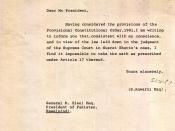IntroductionThe Hudood Ordinance is a law which was enacted in 1979 by Pakistani President Zia-ul Haq as part of a process to Islamize Pakistani society. This law has been revised and replaced in 2006 by the WomenÃÂs Protection Bill. This paper studies the legal definitions of Hudood Ordinance. It analyzes the Islamic concepts of rape and talks about the effects of this ordinance on women. It makes suggestions and recommendations regarding the reform of the law.
The Hudood Law implements the Islamic Sharia by enforcing punishments for Zina, Qazf, theft and drinking of alcohol. Zina is defined as extramarital sex in Islam. It prescribes punishments for Muslim men and women for the act of Zina. The punishment for adultery is stoning to death for married person, while an unmarried person receives one hundred lashes or being exiled for twelve months. The conditions for the implementation of the punishment are that the accused must be a practicing Muslim.
Further the accused must have committed adultery out of his/her free will. There must be four male witnesses who can support the accusation. Zina-bil-jabr is referred to as sexual intercourse with a woman or man against the will of the victim or without the consent of the victim. It can also be committed if consent has been obtained by coercion, intimidation or threats. Penetration is sufficient to constitute the sexual intercourse to prosecute the offence of zina-bil-jabr. Islamic scholars state that rape is the same as adultery or fornication which carries the same punishment. PakistanÃÂs Law of Evidence is discriminatory towards women as it requires the evidence of two women as compared with that of one man in the case of Muslims. ÃÂThe Zina Ordinance does not take into account a womanÃÂs evidence even if she is the victimÃÂ .
History of Hudood...


